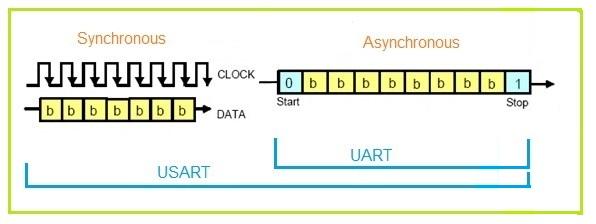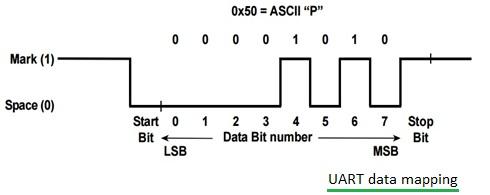UART vs. USART: Key Differences Explained
Advertisement
This article clarifies the distinctions between UART (Universal Asynchronous Receiver/Transmitter) and USART (Universal Synchronous/Asynchronous Receiver/Transmitter). We’ll delve into their characteristics and explore the scenarios where each is most suitable. You can also find links to comparisons of UART with SPI and I2C.
UART (Universal Asynchronous Receiver/Transmitter)
-
Full Name: Universal Asynchronous Receiver/Transmitter.
-
Data Rate: Generally supports lower data rates compared to USART.
-
Baud Rate Requirement: The receiver must know the transmitter’s baud rate before communication can begin. This means you need to agree on the speed beforehand.
-
Protocol Simplicity: UART is a relatively simple protocol. It relies on:
- A start bit (typically a low logic level) before the data word.
- One or two stop bits (typically a high logic level) after the data word.
- An optional parity bit (even or odd) for basic error detection.
The following image shows the structure:

- UART Packet Structure: 1 start bit (low), 8 data bits (including parity), 1 or 2 stop bits (high).
- Transmission Style: Data is transmitted byte by byte.
- Clocking: UART generates its own internal clock and synchronizes it with the incoming data stream based on the transition of the start bit.
- RS232 Connection: UART is often referred to as RS232, a common serial communication standard.
- Voltage Levels: For longer distances, the standard 5V UART signal is often converted to higher voltages, such as +12V for logic 0 and -12V for logic 1 to improve signal integrity.
The following image shows the data mapping.

USART (Universal Synchronous/Asynchronous Receiver/Transmitter)
-
Full Name: Universal Synchronous/Asynchronous Receiver/Transmitter.
-
Data Rate: Supports higher data rates because it can generate a clock signal along with the data (synchronous mode).
-
Baud Rate Requirement: In synchronous mode, the receiver does not need to know the transmitter’s baud rate beforehand. This information is derived from the clock signal accompanying the data.
-
Transmission Style: Synchronous data is generally transmitted in blocks.
-
UART Compatibility: USART can be configured to operate like a UART, making it a more versatile option. However, a standard UART cannot emulate a USART’s synchronous capabilities.
-
Protocol Complexity: USART is more complex and can support various protocols for data transmission, including LIN, SPI, I2C, Modbus, and IrDA.
-
Clocked Data: The USART utilizes a clock signal to reliably detect and decode the data, typically sampling in the middle of each bit period.
Advertisement
 RF
RF






